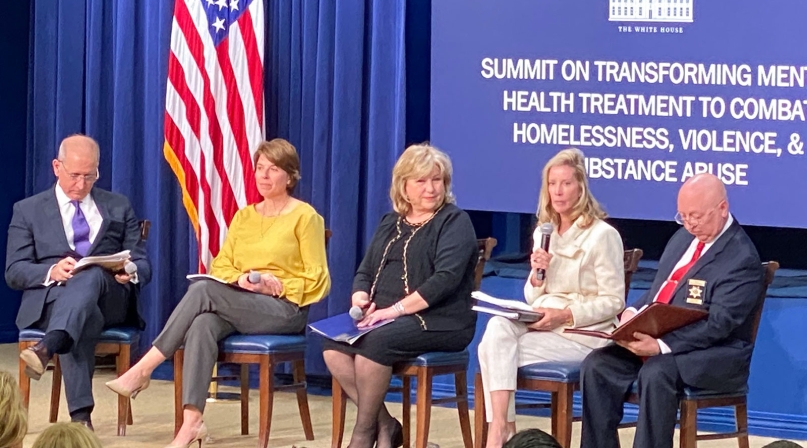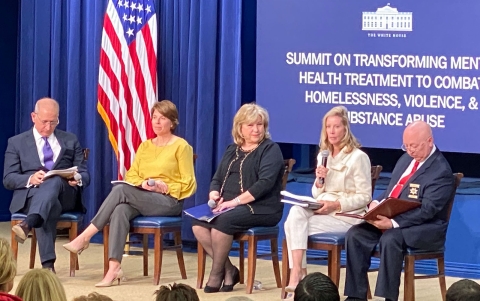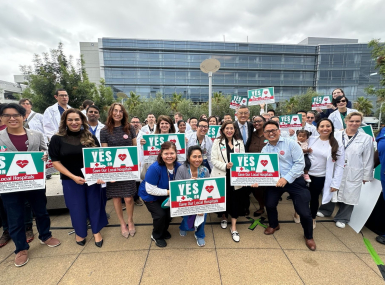White House summit explores mental health treatment

More than 11 million Americans had a serious mental illness last year and one third of those went untreated, according to the Department of Health and Human Services.
“We’re way behind on mental health in our country,” President Trump told an audience of mental health stakeholders, including county officials, Thursday at the White House.
“My administration is strongly committed to helping Americans suffering from mental illness,” the president said. “We have to take care of our mentally ill.”
About 400,000 of the mentally ill, at any given time, are in prison or jail, Secretary of Health and Human Services Alex Azar said.
Calling it “one of the most neglected aspects of our healthcare system,” Azar and other speakers discussed ways to meet the challenges of treating the mentally ill.
In Chatham County, Ga., like many counties around the country, about 20 to 25 percent of the jail population suffers from a mental disorder and/or substance abuse, Commissioner Helen Stone told the audience. “The reality of this is very painful.”
She told the audience that when they go back home, “take a tour of your jail. Ask the sheriff to show you where inmates that suffer from a mental illness are housed. It will change your perspective.”
“Our sheriffs are not set up to run a mental health hospital,” she said. “It’s a terrible burden to them. Not to mention the fact that the people who work there are not trained mental health professionals.”
“When someone comes in for an assessment, they may not know what medication they’re on, what medication they need to be on,” she said, “they’re just shooting in the dark and sometimes it works and sometimes it doesn’t.”
Stone told audience members that the county has created a group called “Breaking the Cycle,” patterned on NACo’s Stepping Up initiative.
Others considering starting a similar group should ask six basic questions, Stone said:
- Is our leadership committed?
- Do we conduct timely screenings and assessments?
- Do we have baseline data?
- Have we conducted an inventory of our services?
- Do we practice policy and funding improvements?
- Do we track the progress?
She also said that through the NACo task force with the National Sheriffs Association, “we’re trying to call attention to the jail inmate Medicaid exclusion.”
“Here’s the problem: If an inmate is booked into jail, they’re going to lose their rights to Medicaid. These are pre-trial detainees. Why are their rights being stripped before being proven guilty? All it is, is a cost-shift measure... And it’s not right.”
“They can’t get those services reinstated, what do you think is going to happen?” she asked. “They’re going to be right back. And think of what it’s costing. It needs to be corrected. It’s not fair to the individual, it’s not fair to the taxpayer and it’s certainly not fair to the sheriff.”
Chatham County has created a new diversion center opening in May, she noted, that is especially critical for those who would lose their benefits if they can’t post bail.
Find out more about the new center here.
“I applaud your center,” fellow panelist Sheriff Ben Wolfinger of Kootenai County, Idaho, said. “We have a 24-hour center, a drop-off center in my county. It’s law-enforcement friendly. We figured in the last quarter we reported, we saved the hospital $500,000. People who would normally report to the emergency room went to the crisis center. That’s real money.”
Wolfinger also noted the challenges to rural counties of funding mental health professionals for jails. Of 44 counties in Idaho, there are 36 jails and only two have mental health professionals, he noted. One solution would be to forgive student loans in exchange for having health professionals dedicate time to serving rural counties.
“We need resources in our rural communities,” he said. “Dealing with the mentally ill is a huge, onerous responsibility that we had to take on because nobody else will do it. We’ve got to get our hands around this problem.”
Also read: Legislation introduced to protect federal health benefits for pre-trial individuals.
See congressional legislation — Restoring Health Benefits for Justice-Involved Individuals: S. 2626 and Equity in Pretrial Coverage: S. 2628.
Watch a video of Thursday’s White House mental health summit on C-SPAN here.

Attachments
Related News

CMS issues new guidance on Medicaid Community Engagement Requirements
On December 8, the Centers for Medicare & Medicaid Services (CMS) released a Medicaid and CHIP Services Informational Bulletin (CIB) directing states on how to implement the Medicaid community engagement requirements enacted under Section 71119 of the One Big Beautiful Bill Act legislation (Public Law 119-21), or H.R. 1.

California county sales tax measure backfills federal healthcare cuts
Santa Clara County, Calif. will raise an estimated $330 million each year from a sales tax to backfill lose Medicaid funding.

